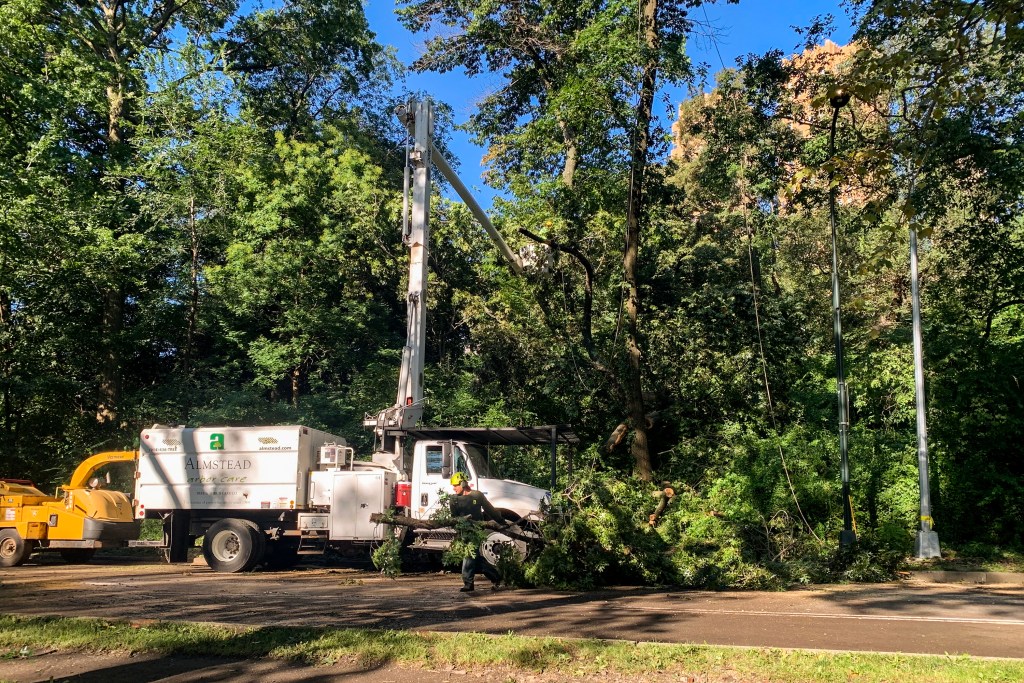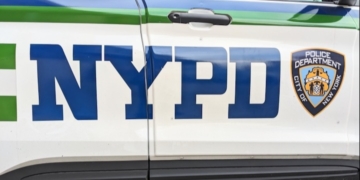
This story is adapted and expanded from a guide created by THE CITY in 2021. What else should we include in this article? Email ask@thecity.nyc or tell us through Ask Nellie, our portal for anything you’d like to ask THE CITY newsroom.
By Rachel Holliday Smith, THE CITY
There’s a storm drain clogged on your block. Or maybe you really need an expedited passport. Or you’re sick of staring at those old bicycles chained to the fence around your subway station.
Who you gonna call?
Maybe it’s your City Councilmember or state representative. Or should you call a government agency directly? When should you try to get a member of Congress involved? And does calling 311 ever help?
THE CITY spoke to a slew of experts with years of experience in constituent services — i.e. the public officials’ staffers whose job is to assist locals — at all levels of government in New York about how they’ve handled and redirected queries on all of those issues and more.
Here’s who has the power to fix what, and how to get their attention (we don’t recommend actually yelling):
The Basics: Who Represents Me
It can be really hard to find the right tree to bark up in New York City, especially since many problems have overlapping local, state or federal jurisdiction.
For instance, Congressman Dan Goldman’s (D-Manhattan/Brooklyn) staffers say they often get calls about vandalized mailboxes in public housing lobbies. But who’s responsible for fixing them depends on precisely where the damage happened, said Goldman’s district director John Blasco.
“If the entire bank (of mailboxes) is coming off the hinges, that’s a NYCHA [New York City Housing Authority] maintenance issue. However, if that little lock in the middle that opens everything is broken, that’s a United States Postal Service maintenance issue,” he said.

If you don’t know where to begin with your own problem, start by looking up who represents you in this database created by the Center for Urban Research at CUNY and the League of Women Voters in NYC.
That will at least give you some contact information for your elected officials, which is half the battle, said Sean Coughlin, former chief of staff to Councilmember Erik Bottcher and special advisor for ex-Councilmember Corey Johnson in Chelsea and Hell’s Kitchen who now works in public affairs at Pace University. He said when he worked in constituent services when Johnson was Council speaker “we would get calls from folks in The Bronx and from Queens,” which all had to be redirected.
Another great place to start is your local community board, where staff will likely be familiar with a wide variety of neighborhood issues. Each volunteer-run board has a paid district manager who operates the board and holds monthly, charter-mandated meetings with liaisons at all major city agencies to discuss issues in the neighborhood.
“The community board district manager has direct ties to these agencies,” said John Sanchez, executive director of the 5 Borough Housing movement and former district manager at Bronx Community Board 6.
“A competent community board office should be able to direct you to the right agency. But I’m emphasizing ‘competent’ because not all community boards are competent,” he added.
That goes for all elected offices, too, experts said. Some Council members will have responsive staff, but others fall short. Some Congressional reps will have helpful community liaisons, and others will have short-staffed offices. If you find a helpful person but in the wrong office, ask if they’ll help you find the right person to contact.
Finding the right levers of power can frustrate even the most hardened New Yorker. But even so, Coughlin said it’s always best to “come in relatively cool … asking for help rather than demanding action.”
“I certainly understand righteous indignation in the face of a mounting and glacial bureaucracy that you feel isn’t serving your needs, but, ultimately, it’s just some human being who’s trying to make their rent on the other end of the phone,” he said. “Be kind.”
Senior centers and libraries can help you, too. Find that person who can translate your problem into “government-ese,” as one public administrator put it. That could be a longtime resident, advocate or the leader at a local community space or nonprofit.
Call 311. No, Really.
Every government expert at all levels told THE CITY the one thing frustrated New Yorkers may not want to hear: You have to report this to 311.
Why? First, it creates a “ticket” that serves as a tracking number for the problem that can be traced through all levels of the bureaucracy.
“It’s just a way to put on the record what your complaint is about something, and any constituent can go to any office — city, state, or federal — with a 311 complaint to help the office then follow up with an appropriate agency, to keep eyes or monitor the progress of the complaint,” Blasco said.
Tevin Williams, director of community affairs at Rep. Goldman’s office, said that makes things much simpler when their federal office has to refer something to a state or city agency.
“For us, we reach out to the state partner and say, ‘Hey, we have Jane Smith who came to our office. This is the summary of the case. This is what she needs help with. Can we either get her to call you or get one of your caseworkers to reach out to her?’” he said.
Putting your issue on the record also makes it much harder for agencies to ignore.
“What the agencies love to say is ‘This is the first time hearing of it.’ It’s their absolute favorite response” said one longtime City Council staffer. The 311 ticket “negates their ability to say no one has complained about it.”
Typically, experts say it’s better to submit a 311 complaint online rather than on the phone because the system online or by the 311 app allows you to categorize the problem, rather than relying on a 311 operator to do so.
(A notable warning here is that public housing residents have their own ticket system, MyNYCHA, outside of 311 that residents in NYCHA must use when submitting complaints.)

Complaints coming in through 311 are also really important for budgeting purposes, experts said. If an issue is recorded over and over, it’s easier for an elected official to make a case that money should be spent to fix it.
“The relevant agency will only apply resources to an issue if the city’s data system is showing that X number of complaints or concerns have come in about that very issue,” Blasco said.
Federal Cases
What are the most common problems in the city that a federal representative’s office should handle? (Here’s how to find your Senator or House Representative.) We asked the experts:
- A missing or broken postal box, which is a responsibility of the USPS
- Passport renewals or expediting
- Health issues with the Sept. 11 Victim Compensation Fund
- Problems with federal rent vouchers, like Section 8
- Tax issues, handled by the Taxpayer Advocate with the Internal Revenue Service
- Immigration issues of all kinds, particularly visa processing problems
Before you call a federal representative for help, know that for them to assist you, you’ll need to sign a privacy release form that gives your representative the authority to act on your behalf, said Blasco.
“That is a really important thing that a lot of people don’t know. You could be living here, you could be living in Chicago, you could be wherever, Washington,” he said. “Every member of Congress, no matter the party affiliation, has a privacy release form and the only way a member of Congress can advocate with a federal agency for your inquiry is by you giving authorization to that Congress member’s office to do so.”
State Business
What are the most common state-level issues in New York City? Here’s what government workers said they get the most inquiries about. Your state Assembly member or state senator could help with these problems:
- Unemployment issues, payments and processing: state Department of Labor
- Status of business’s liquor license: the State Liquor Authority and your local community board
- Problems with rent-stabilized housing, or requesting your rent history: Division of Housing and Community Renewal
- Issues with subway train cars, public buses, stations or service: New York City Transit, a division of the MTA
Misdirected calls about public transportation is a perennial issue for city government workers, who often have to explain to constituents that the MTA is a state authority controlled by the governor, not a city agency.
“That’s under the state, but it’s why [former Mayor Bill] de Blasio was yelled at for eight years for the failure of the subways because people just don’t know that,” said Coughlin.
City Life
We asked the experts about common city-level questions that come up, and where they need to be dealt with. City Councilmembers, borough presidents or your local community board can help with these if you can’t get through to an agency:
- Illegal parking, potholes and street lights on city streets: Department of Transportation
- Park cleanliness and reserving public park space for events: Parks Department
- NYC Connect, the affordable housing lottery: Department of Housing Preservation and Development
- Trash, illegal dumping and derelict bicycles on public property: Department of Sanitation
- Street trees: Confusingly, the trees themselves are the purview of the Parks Department, but an empty tree pit is the purview of the Department of Transportation. Once a tree disappears, Parks relinquishes responsibility to the DOT.
- Construction of a new school: the New York City School Construction Authority, a state-created entity in charge of designing, constructing and renovating all public schools in the city.
The Hardest Stuff
Some of the toughest problems are ones that are under a little-known jurisdiction, or need multiple offices to fix, or are just notoriously intractable. Here are just some mentioned by the bureaucracy experts THE CITY spoke with for this story:
Illegal demolition is the purview of the Department of Buildings, but is really tough to stop once it begins. Property owners may claim they didn’t know they needed a permit, or weren’t aware of a landmark district where demolition is banned.
Reports of driver misconduct made to 311 have a habit of disappearing once they land with the police department, Streetsblog found in an analysis of millions of such calls.
Noise complaints go to both the police department and the city Department of Environmental Protection, but illegal noise is very hard to prove and harder to stop. It’s not uncommon for overnight construction work to be legally permitted either by the DOT or DOB, and therefore allowed to continue.

Confusion around special enforcement offices is perennial. The public is largely unaware of the Office of Special Enforcement, which handles all issues with illegal short-term rentals i.e. Airbnb-style accommodations, and the Special Narcotics Prosecutor, a citywide office that handles prosecutions of narcotics law felonies.
Problems within specially appointed “authorities” are handled by those administrations, often a state-created, quasi-public entity with varying levels of responsiveness and opaqueness. There are many in New York City, most notably the New York City Housing Authority, Battery Park City Authority, Roosevelt Island Operating Corporation and Port Authority of NY and NJ, which operates the areas three major airports, the Manhattan bus terminal, major Hudson RIver bridges and tunnels and PATH trains.
It’s a lot. And constituent services staffers know that.
“By the time people come to you, they’ve been failed so many times that they’re really at a desperate point,” said Coughlin.
“The person calling doesn’t care what level of government something is about. They just want it dealt with,” said Sanchez.
Got a question about how the city works? Have something to add that other New Yorkers should know? Email ask@thecity.nyc or tell us through Ask Nellie, our portal for anything you’d like to ask THE CITY newsroom.
THE CITY is a nonprofit newsroom that serves the people of New York. Sign up for our SCOOP newsletter and get exclusive stories, helpful tips, a guide to low-cost events, and everything you need to know to be a well-informed New Yorker.









Don’t forget business improvement districts. They typically have crews in the field and can quickly tackle smaller issues that just need a helping hand and not major investment from the city. E.G. A crosswalk sign gets turned sideways and just needs a push by someone standing on a ladder….call the BID!
Very informative and helpful. I’m saving this article for future use.
311 is a scam, no really. I’ll give you one example. On the NW corner of 96th and Broadway, a very dangerous intersection, there was No Standing implemented and Zebra striping added. This was done to increase visibility at the curb. Every day there are food trucks and a fruit stand parked there along with their personal cars completely blocking the visibility. I have called and filled out the online 311 with photographs. The complaints are routed to the 24 who respond very quickly with “problem resolved” or other nonsense while I ‘m standing there looking at it. It’s a complete joke
When they respond “problem resolved” or that they responded and found no issue, file another complaint immediately stating that you were out there from the moment you filed the first complaint and it was closed without anyone actually coming to the scene. I have seen that make a difference.
I have also called precincts directly regarding illegal license plates after receiving those responses, stating that I had gotten those responses when there was no action and that I had been there the whole time, and then something was done. For example, there was a Ducati motorcycle that had a temporary plate and tape over the plate blocking it. I put it in to 311 with photos and it was closed within minutes. I did it a second time on a subsequent day with the same results. I called the precinct on a third day, spoke to a sergeant, and relayed the story. The motorcycle was towed.
I don’t think that is 311’s fault. They correctly contact the 24th precinct who tells them the problem has been resolved. 311 isn’t going to double check. The problem here is that the 24 doesn’t care about this issue.
I emailed and called Gale Brewer’s office on an issue that occurred in November involving my ethnicity and 2 months later there’s neither an informed response nor any action on my concerns. I called Brad Hoylman’s office on the same issue and was blown off. I called Danny O’Donnell’s office on the same issue and got no response. Do I have to speak to AD69 candidates at the AMNH greenmarket or the subway station when they want me to sign a petition to get them on the ballot in March to get people in power to listen to my problems and try to address them?
One thing I’ve learned about elected officials is that unless they are afraid a news outlet like WSR will run a story about what you’ve dealt with, elected officials around here won’t be too helpful.
Who do you call about the sickening white graffitti that continues appear on our blue mailboxes?
The most underrated elected officials to contact are the Democratic District Leaders or State Committee members. Many of them aspire to higher office one day and are eager to build relationships in the community. I’ve found party leaders to be more responsive than traditional elected officials sometimes.
311 is a joke and utterly infuriating. I cannot count the number of times I have called in noise complaints, most recently when there was ” Global” concert going on in Central Park in the 70’s and for HOURS, for two days in a row, there was unbearably loud, ceaseless thumping, and 311 said they knew of no events taking place in my zip code. Who are these people?? I have neighbors who are professional musicians trying to practice and were were in tears (as I was). Unless Helen Keller is in charge of taking calls to 311, something MUST BE DONE! The system is a cruel joke.
And while I’m at it, the pavement upon which crosstown buses drive on 86th, 79th, 72nd and 66th are so shockingly bumpy, they make rocky horse paths in in the wilds of Kentucky seem smooth.
I don’t know where our tax dollars are going, but they surely aren’t evident in either case.
We’ve called for the horror that is Taste of the Upper West Side. I mean if you don’t live near it, I’m sure it’s fun. If you live across the street from it it’s days of insanely loud music along with a DJ/Emcee, all of which can be heard with the windows closed, ac on, so loudly we’re shouting inside the apt and music and tv are useless.
Also the setup and teardown are trucks beeping, workers blasting music and yelling at each other, metal beams being dumped around, until 2 and 3am.
When we call it’s just ‘there’s a permitted event going on.’ As if there are just no limits whatsoever to the noise level, time, anything. It’s infuriating. They have a permit but there has to be some limit to the db.
Enough is enough. Who do I call to eliminate the overabundance of scaffolding plaguing the UWS?